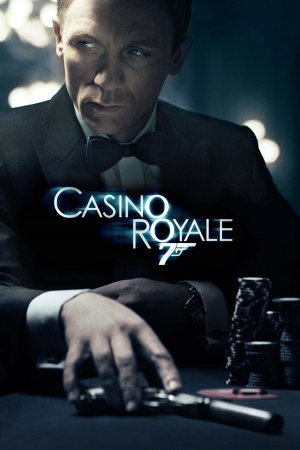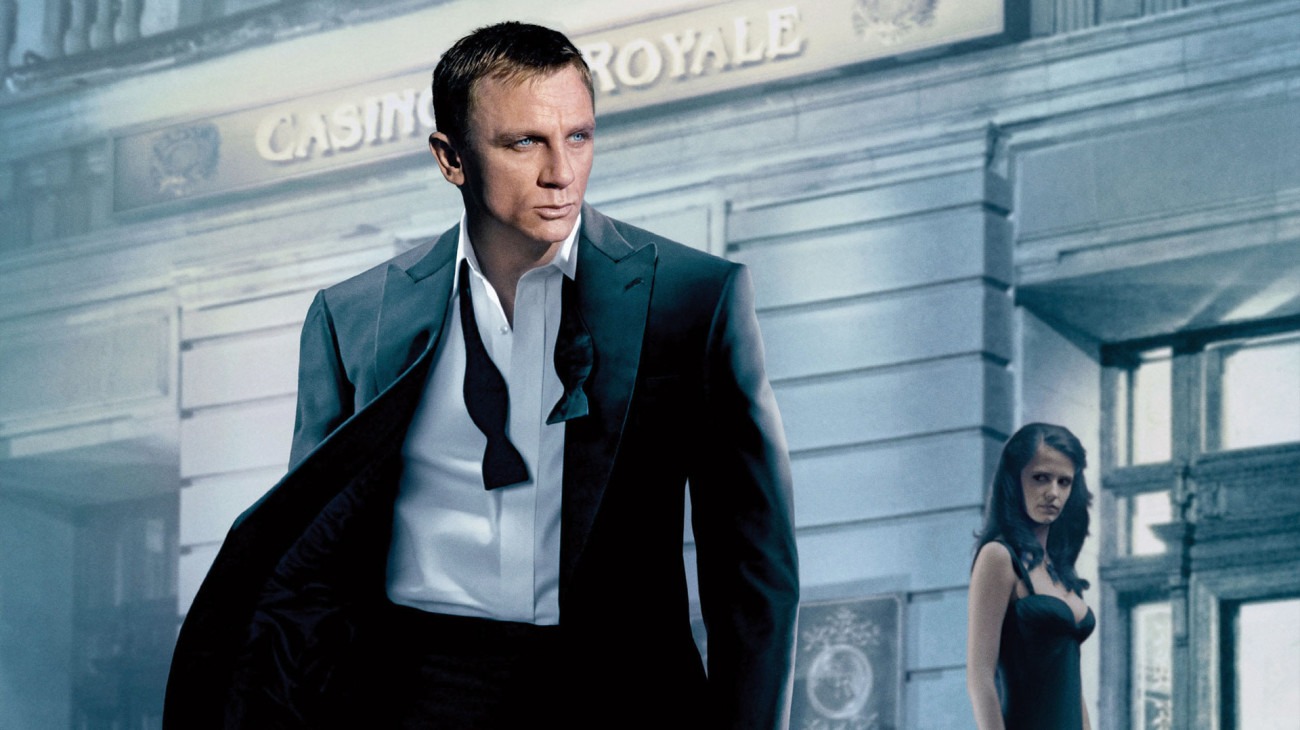
Have no fear, Bond is here
It's a wonderful thing to have ludicrously heightened expectations, and then to see them surpassed. I give you Casino Royale, the best James Bond film since the '60s, starring Daniel Craig as the best James Bond since Sean Connery.
British spy thrillers aren't for everyone, and if the notion of a really top-drawer Bond film doesn't set your heart a-racing, you may as well stop reading. Because for all the many things that Casino Royale does fantastically, it never seeks to rise above its franchise, preferring instead to perfect it. It's certainly the best action film of the year, but for the sizable portion of the audience that can't abide action films, I will not pretend that it's an art film hiding in genre clothes.
As we all know by now, it's an origin story: the tale of how MI6 spy James Bond is promoted to the elite rank of 00-Agent in the British Secret Service; and his first assignment, a poker tournament where he must bankrupt Le Chiffre (Mads Mikkelsen), a terrorist financier. What it's not is a male fantasy, like so many of the films preceding it: this Bond is not an elegant GQ model, and he doesn't have fancy toys, and if he's irresistible to women, it's not because of his charm but because of his almost violent raw sexuality. He is a thug, a "blunt instrument" as his superior (quoting creator Ian Fleming) informs him.
Casino Royale is the punk rock version of James Bond. It strips away the bombastic accretion of CGI and idiotic whimsy (invisible car, anyone?) that the series has been wallowing in for years, and returns the concept to its rawest form: a man paid by his government to kill people. If that makes the film sound nasty, that's what it is. It's not the most violent film in the series, but it is certainly the most brutal, and alongside On Her Majesty's Secret Service, it's probably the most depressing.
I don't want to make it seem like it's a slog. On the contrary, precisely because it's so unsparing, it's the most visceral Bond film - hell, action film period - in ages. Watching Pierce Brosnan surf in front of a CGI wave, one can only think, "hey, it's a CGI wave." Compare that to the first major setpiece in Casino Royale, wherein Craig chases a gunrunner through a construction site on foot. First off, when was the last time a Bond film had a chase scene on foot? More importantly, everything onscreen is real: the jumping across rooftops, the climbing on cranes in midair, watching Bond generally clomp around with far less grace than action heroes are usually permitted (the scene that stands prominent in my mind: Bond's quarry darts around a sheetrock wall, while Craig bursts right on through it). It's inelegant and bestial and extraordinarily real, and it's the sort of sequence where you can't breathe or blink.
The realness pervades the film: the villain isn't monstrous or mutated, and his ee-vil death trap is shockingly low-key (and disturbing - it's a scene taken directly from the book, and that was already bothersome, but to actually see it...let's just call Casino Royale the best cinematic argument against torture that has ever been made and call it a day); the Bond Girl, Vesper Lynd (Eva Green) isn't absurdly sexual or obnoxiously quippy, she's just a sexy accountant. I could go on, but you see the point: everything has been scaled way back, as far back as the relatively quiet Dr. No or From Russia with Love, and this is a prime example of less being more.
The director, Martin Campbell, has worked in the series before, shepherding a one-film renaissance with Brosnan's role debut in GoldenEye. And while that film was well-made, this one is far better. For all that the film has the series' longest running time at 144 minutes, much of that taken up by lengthy poker-playing scenes, there is hardly a flabby or flat moment anywhere. It is one of the most constantly tense of all Bond movies, up until its (fantastic) final line. Would that I could explain how this was effected! But in the theater, I was a fanboy, and fanboys do not pay attention to directorial niceties.
Is there moral complexity? No. Is there any sort of theme at all? Kind of, a fixation on how men turn into animals, but given the presence of script doctor Paul Haggis, it's not at all surprising how unsubtly this is showcased (that said, this is just about the finest work of his career). In fact, for reasons of "art" there's no real reason to see Casino Royale at all. But it is breathtakingly cinematic, and very thrilling, and as much pure fun to watch as anything I've seen this year.
9/10
British spy thrillers aren't for everyone, and if the notion of a really top-drawer Bond film doesn't set your heart a-racing, you may as well stop reading. Because for all the many things that Casino Royale does fantastically, it never seeks to rise above its franchise, preferring instead to perfect it. It's certainly the best action film of the year, but for the sizable portion of the audience that can't abide action films, I will not pretend that it's an art film hiding in genre clothes.
As we all know by now, it's an origin story: the tale of how MI6 spy James Bond is promoted to the elite rank of 00-Agent in the British Secret Service; and his first assignment, a poker tournament where he must bankrupt Le Chiffre (Mads Mikkelsen), a terrorist financier. What it's not is a male fantasy, like so many of the films preceding it: this Bond is not an elegant GQ model, and he doesn't have fancy toys, and if he's irresistible to women, it's not because of his charm but because of his almost violent raw sexuality. He is a thug, a "blunt instrument" as his superior (quoting creator Ian Fleming) informs him.
Casino Royale is the punk rock version of James Bond. It strips away the bombastic accretion of CGI and idiotic whimsy (invisible car, anyone?) that the series has been wallowing in for years, and returns the concept to its rawest form: a man paid by his government to kill people. If that makes the film sound nasty, that's what it is. It's not the most violent film in the series, but it is certainly the most brutal, and alongside On Her Majesty's Secret Service, it's probably the most depressing.
I don't want to make it seem like it's a slog. On the contrary, precisely because it's so unsparing, it's the most visceral Bond film - hell, action film period - in ages. Watching Pierce Brosnan surf in front of a CGI wave, one can only think, "hey, it's a CGI wave." Compare that to the first major setpiece in Casino Royale, wherein Craig chases a gunrunner through a construction site on foot. First off, when was the last time a Bond film had a chase scene on foot? More importantly, everything onscreen is real: the jumping across rooftops, the climbing on cranes in midair, watching Bond generally clomp around with far less grace than action heroes are usually permitted (the scene that stands prominent in my mind: Bond's quarry darts around a sheetrock wall, while Craig bursts right on through it). It's inelegant and bestial and extraordinarily real, and it's the sort of sequence where you can't breathe or blink.
The realness pervades the film: the villain isn't monstrous or mutated, and his ee-vil death trap is shockingly low-key (and disturbing - it's a scene taken directly from the book, and that was already bothersome, but to actually see it...let's just call Casino Royale the best cinematic argument against torture that has ever been made and call it a day); the Bond Girl, Vesper Lynd (Eva Green) isn't absurdly sexual or obnoxiously quippy, she's just a sexy accountant. I could go on, but you see the point: everything has been scaled way back, as far back as the relatively quiet Dr. No or From Russia with Love, and this is a prime example of less being more.
The director, Martin Campbell, has worked in the series before, shepherding a one-film renaissance with Brosnan's role debut in GoldenEye. And while that film was well-made, this one is far better. For all that the film has the series' longest running time at 144 minutes, much of that taken up by lengthy poker-playing scenes, there is hardly a flabby or flat moment anywhere. It is one of the most constantly tense of all Bond movies, up until its (fantastic) final line. Would that I could explain how this was effected! But in the theater, I was a fanboy, and fanboys do not pay attention to directorial niceties.
Is there moral complexity? No. Is there any sort of theme at all? Kind of, a fixation on how men turn into animals, but given the presence of script doctor Paul Haggis, it's not at all surprising how unsubtly this is showcased (that said, this is just about the finest work of his career). In fact, for reasons of "art" there's no real reason to see Casino Royale at all. But it is breathtakingly cinematic, and very thrilling, and as much pure fun to watch as anything I've seen this year.
9/10






